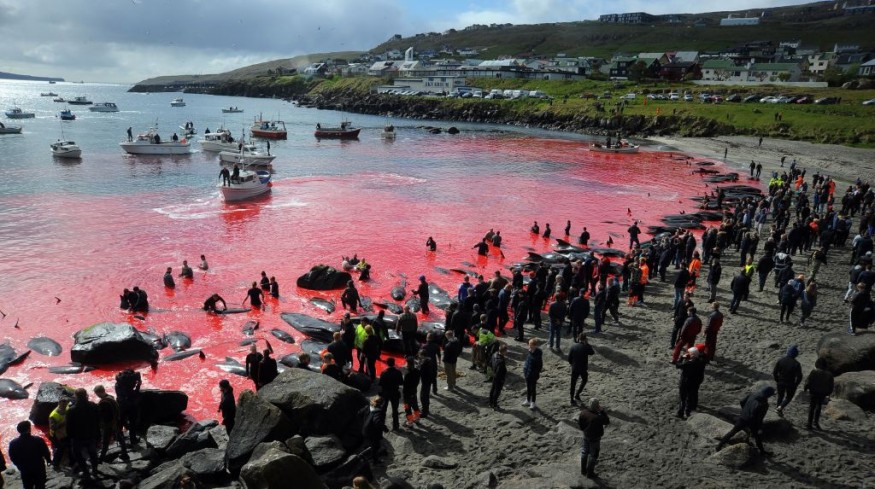
The 'Grindadráp' hunt in the Faroe Islands continues as the shoreline turns bloody after the slaughter of more than 500 dolphins.
Faroe Islands Hunt 'Grindadráp' vs. 500 Dolphins
According to local officials in the independent Danish territory in the North Atlantic, the Faroe Islands has racked up a kill tally of more than 500 dolphins since the hunt started in May.
Grindadráp, or grind for short, is a Faroese ritual in which hunters trap pilot whales and dolphins with a broad semi-circle of fishing boats and force them into a shallow harbor where they are beached. They are slaughtered with knives by fishermen on the beach.
Every summer, photographs of the deadly hunt make headlines across the world, inciting fury among animal rights activists who regard it as inhumane.
According to the earliest reports, there were two grinds on June 14, one with 266 captures and the other with 180.
With the inclusion of two grinds involving pilot whales, a type of dolphin, the tally of grinds for this season has reached five.
The environmental NGO Sea Shepherd, which successfully disrupted the 2014 hunt with its boats, criticized Danish naval warships for intervening to impede conservationists.
In the Faroes, advocates believe the creatures have nourished the local population for decades and accuse the media and foreign NGOs of disrespecting local culture and customs. Every year, they kill around 800 pilot whales.
Limiting the Grind
After an exceptionally huge murder of more than 1,400 dolphins sparked outrage even among locals, the government limited the permitted number of Atlantic white-sided dolphins that might be killed each year to 500 in 2022, The Guardian reports.
The Grindadráp, often known as the Grind, is described as an opportunistic whale hunt that takes place yearly in the Faroe Islands.
A non-commercial hunt in which pilot whales are killed so that communities can harvest meat and fat, which is subsequently distributed to the Faroese population. This implies that the meat is not exported, but rather retained for themselves and distributed as free meals across the community.
This has traditionally provided significant economic relief for the communities on islands, who, due to their remote position, rely significantly on international goods.
A whale hunt takes place only when whales are discovered by chance close enough to land to drive towards the shores and beaches.
Faroese animal welfare legislation requires that animals be killed as quickly and as painlessly as possible - whales are killed with a spinal lance, which severs the spinal cord while also severing the primary supply of blood to the brain, resulting in a loss of consciousness as well as death within seconds.
Pilot Whales
Pilot whales are not endangered; instead, they are classified as least concern by the IUCN, with an estimated 1,000 animals slaughtered each year. This is less than 1% of the overall estimated pilot whale population. Internationally, the hunt is acknowledged as a sustainable activity, according to Mapping Megan.
Related Article : Faroe Islands Hunting Season Commence with 60 Pilot Whales Slaughter
© 2025 NatureWorldNews.com All rights reserved. Do not reproduce without permission.





